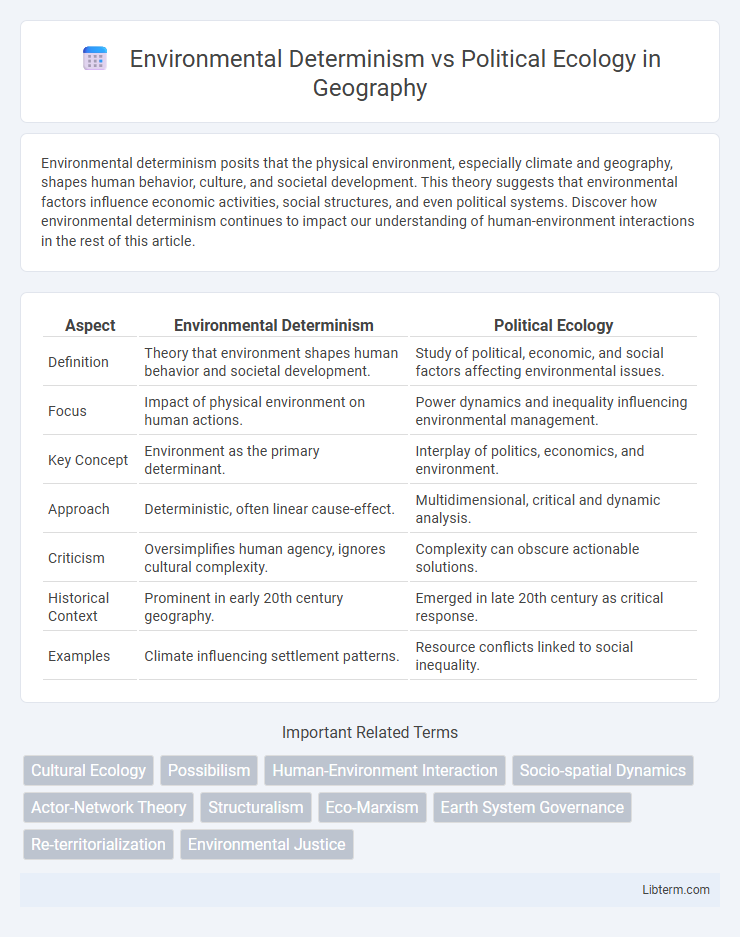Environmental determinism posits that the physical environment, especially climate and geography, shapes human behavior, culture, and societal development. This theory suggests that environmental factors influence economic activities, social structures, and even political systems. Discover how environmental determinism continues to impact our understanding of human-environment interactions in the rest of this article.
Table of Comparison
| Aspect | Environmental Determinism | Political Ecology |
|---|---|---|
| Definition | Theory that environment shapes human behavior and societal development. | Study of political, economic, and social factors affecting environmental issues. |
| Focus | Impact of physical environment on human actions. | Power dynamics and inequality influencing environmental management. |
| Key Concept | Environment as the primary determinant. | Interplay of politics, economics, and environment. |
| Approach | Deterministic, often linear cause-effect. | Multidimensional, critical and dynamic analysis. |
| Criticism | Oversimplifies human agency, ignores cultural complexity. | Complexity can obscure actionable solutions. |
| Historical Context | Prominent in early 20th century geography. | Emerged in late 20th century as critical response. |
| Examples | Climate influencing settlement patterns. | Resource conflicts linked to social inequality. |
Introduction to Environmental Determinism and Political Ecology
Environmental determinism emphasizes the influence of physical environment--climate, terrain, and natural resources--on human behavior and societal development. Political ecology examines how political, economic, and social factors shape environmental issues, highlighting power dynamics and inequalities in resource management. Together, these frameworks offer contrasting perspectives on the relationship between humans and their environment, with environmental determinism focusing on natural constraints and political ecology emphasizing human agency and socio-political contexts.
Historical Development of Environmental Determinism
Environmental determinism emerged in the late 19th and early 20th centuries, rooted in the works of geographers such as Friedrich Ratzel and Ellsworth Huntington, who argued that physical environments shaped human cultures and societal progress. This theory gained prominence during the colonial era, often used to justify imperialism by attributing cultural and economic differences to climatic and geographical conditions. However, environmental determinism faced criticism for its reductionist approach and deterministic assumptions, leading to the rise of political ecology in the 1970s, which emphasizes the complex interactions between political, economic, and environmental factors.
Foundations and Key Principles of Political Ecology
Political Ecology integrates ecological concerns with political economy, emphasizing how power dynamics and social inequalities shape environmental outcomes. It challenges Environmental Determinism by rejecting the notion that the environment solely dictates human behavior, instead highlighting human agency and socio-political factors as critical determinants. Core principles include the analysis of resource control, environmental justice, and the impact of capitalism and globalization on ecological degradation.
Comparing Theoretical Frameworks
Environmental determinism emphasizes the influence of physical geography on human societies, arguing that environmental factors shape cultural development and societal outcomes. Political ecology challenges this view by integrating social, political, and economic dimensions, highlighting how power relations and human agency mediate environmental impacts. Comparing these frameworks reveals environmental determinism's focus on natural constraints contrasted with political ecology's multifaceted analysis of human-environment interactions.
Influential Scholars and Thinkers
Environmental determinism, championed by scholars like Ellsworth Huntington and Jared Diamond, argues that physical geography and climate primarily shape human behavior and societal development. Political ecology, influenced by thinkers such as Eric Wolf and Piers Blaikie, emphasizes the complex interactions between political, economic, and environmental factors, highlighting power dynamics and social inequalities. These contrasting perspectives underscore the evolving debate on human-environment relationships in academic discourse.
Critiques of Environmental Determinism
Environmental determinism faces significant critiques for oversimplifying complex human-environment interactions by attributing social and cultural development solely to physical geography and climate. Critics argue it neglects human agency, economic structures, and political contexts that shape environmental outcomes, leading to deterministic and reductionist conclusions. Political ecology counters this by emphasizing the role of power relations, socioeconomic factors, and historical processes in shaping environmental issues, offering a multidimensional framework beyond the limitations of environmental determinism.
Political Ecology’s Response to Environmental Determinism
Political Ecology challenges Environmental Determinism by emphasizing the socio-political factors that shape environmental outcomes rather than attributing them solely to natural conditions. It highlights how power relations, economic interests, and cultural practices influence environmental degradation and resource management. This perspective underscores the role of human agency and systemic inequality in environmental change, rejecting the deterministic view that geography or climate alone dictate societal development.
Case Studies: Real-World Applications
Environmental determinism interprets human activities as direct outcomes of environmental conditions, illustrated by Jared Diamond's analysis of how geography influenced societal development in "Guns, Germs, and Steel." Political ecology emphasizes power dynamics and socio-economic factors, evident in case studies like the deforestation conflicts in the Amazon, where indigenous communities challenge corporate land use. Real-world applications reveal environmental determinism's limitations by showing how political ecology provides deeper insights into resource management and environmental justice.
Contemporary Debates in Human-Environment Interaction
Environmental determinism posits that human activities and societal development are primarily shaped by physical environmental conditions, often leading to critiques about its reductionist and deterministic nature. Political ecology counters this by emphasizing the role of power relations, economic systems, and social inequalities in shaping human-environment interactions, highlighting how environmental issues are deeply embedded in political and economic contexts. Contemporary debates focus on integrating these perspectives to better understand complex environmental challenges, acknowledging both natural constraints and socio-political dynamics in shaping environmental outcomes.
Future Directions in Environmental Thought
Future directions in environmental thought emphasize integrating Environmental Determinism's focus on physical geography with Political Ecology's analysis of power dynamics and human agency. Emerging interdisciplinary approaches advocate for complex models that consider both natural constraints and socio-political factors influencing environmental outcomes. Innovations in geographic information systems (GIS) and participatory governance frameworks are pivotal for advancing adaptive and equitable environmental policies.
Environmental Determinism Infographic

 libterm.com
libterm.com